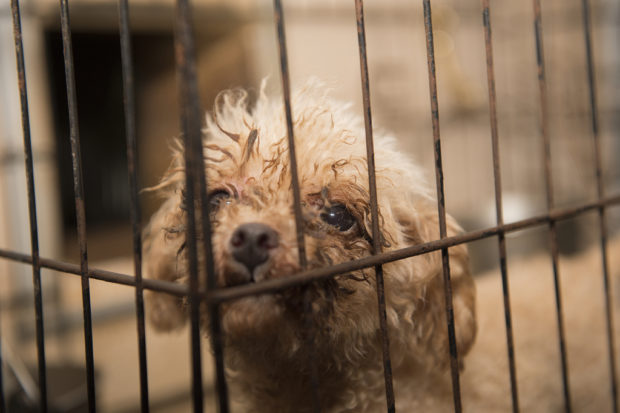
With cities and states imposing quarantines and curfews, and businesses shuttering their doors and asking employees to stay home, animals in institutional settings are extremely vulnerable to neglect and/or abandonment. Photo by Amie Chou/The HSUS
A Manhattan Supreme Court judge has imposed a remarkable $3.9 million in fines on the now-closed Chelsea Kennel Club and its former owner, found liable for pushing sick puppies upon an unsuspecting public, and ordered them to set up a restitution fund for the consumers the pet store betrayed. This penalty without precedent is a direct outcome of the HSUS investigation at the New York City store in 2017.
In the meantime, we continue to bring the heat on puppy mills throughout the country, and a new investigative report released this month by the Nebraska Ombudsman’s Office suggests that there’s more work to be done in that state.
Five years ago, our annual Horrible Hundred report on problem puppy mills identified 14 Nebraska breeders. In 2020, the same report listed just three puppy millers from the state. One might assume that the state has done a great job of bringing greater pressure to bear against puppy mill cruelty, but the opposite is true. Nebraska doesn’t appear to have many problem puppy mills because it’s failing to enforce the law and issue citations to scofflaws.
Deputy Ombudsman Carl Eskridge’s detailed report presented the results of a 20-month-long investigation sparked by a complaint from a whistleblower employed by Nebraska’s Department of Agriculture. The employee claimed the department routinely ignored violations of the state’s Commercial Dog and Cat Operator Inspection Act, leaving animals to suffer in cruel conditions, and often failed to refer complaints of abuse and neglect to county authorities for possible criminal prosecution.
The employee, Rick Herchenbach, a Nebraska animal inspector for nearly forty years, also claims the department took retaliatory action against him.
The 120-page report lists a number of examples of violations by puppy mills and a number of entities casting themselves as “rescue” operations. The Omaha World-Herald described a “particularly difficult inspection attempt” the whistleblowing employee conducted involving multiple complaints over the course of a year of an unlicensed operator, Trifecta Bullies Kennel.
Herchenbach told investigators that he got little support from his agency on that inspection and felt traumatized by the incident because the owners were belligerent and angry and blocked his attempt to leave, with law enforcement officials having to intervene. Some months later, after the owners had ostensibly vacated the property after eviction (but may have been temporarily continuing to use it), Herchenbach reported that he found “deplorable” conditions, including “piles of fresh feces, indicating that dogs were recently inside the garage.” On the basis of what he observed there, urine-soaked floors, a foul odor, piles of trash and clutter, and evidence of mice and rats, Herchenbach concluded that the dogs had not been treated humanely and were still at risk. By then, the owners were moving with “dogs and puppies from motel to motel in violation of regulations. Inspectors had difficulty observing the dogs, and what they did see were bad conditions.”
The neglect of their duties by those charged with protecting animals under the authority of a government agency, wherever and whenever it occurs, is a failure in the systems of oversight and protection we are building to make this world a better one for animals. Right now, it’s a big problem at the state and federal levels. The U.S. Department of Agriculture has seen a dramatic decline in enforcement of the Animal Welfare Act since 2016; in fact, the agency hasn’t revoked a single dog breeder license, or levied a significant fine on a dog breeder, for years. In 2016, the USDA documented 2,451 separate violations at pet breeder facilities. By the end of 2019, that number had dropped to just 896 documented violations—more than a third of which were violations for failure to let inspectors onto the premises at all.
Until we can be sure that dogs and cats raised for the pet trade are safe and living in well-regulated, clean and comfortable conditions, we will continue to advise dog lovers never to buy a puppy from a pet store or Internet site, because cruel puppy mills are too often the source of supply. The Nebraska Department of Agriculture’s failure to enforce breeder and rescue standards currently in place is an alarming demonstration of the problem, and the ombudsman’s rebuke is an encouraging development. The department needs to enforce Nebraska’s applicable laws, which have been on the books for two decades, to address and correct problems it identifies, and to cooperate with law enforcement authorities in the referral and prosecution of criminal complaints where warranted.
The post Judge issues hefty fine on Chelsea Kennel Club for selling sick animals, new report shows Nebraska Department of Agriculture routinely ignores puppy mill suffering appeared first on A Humane World.
Enviroshop is maintained by dedicated NetSys Interactive Inc. owners & employees who generously contribute their time to maintenance & editing, web design, custom programming, & website hosting for Enviroshop.
